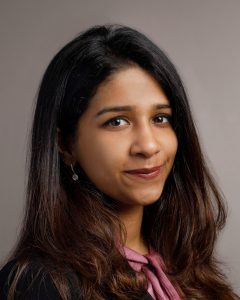Her Pursuit of Radiology Career Was Worth the Wait
By Rodney Campbell, ABR Communications Manager
2025;18(4):6

It took Riddhi Borse, MD, until her fourth year of medical school in India to decide which medical specialty she wanted to pursue.
A family health crisis was the deciding factor when she ultimately chose radiology. Dr. Borse’s father fell ill and needed a lymph node biopsy performed by an interventional radiologist to determine the cause.
The experience was life-changing for father and daughter.
“Luckily, the interventional radiologist had trained in the United States and let me watch the procedure,” she said. “It was an important thing for me to see because it was a crucial diagnosis. People thought it was lymphoma, and it turned out my father had tuberculosis. The procedure made all the difference in his prognosis, and he’s healed today.”
Inspired by what she learned, Dr. Borse set her sights on radiology training in the United States. She did a few electives, including one in radiology at Massachusetts General Hospital (MGH) that she completed in February 2018.
“It was quite a pivot in my medical career,” she said.
She returned to India and graduated from medical school that May. Having been offered a post-doctoral research fellow position at MGH three months earlier, she had to act quickly, leaving the day after earning her medical degree at Topiwala National Medical College in Mumbai on a flight to Boston.
She’s been diligent since arriving here, wrapping a preliminary year at St. Vincent Hospital, completing a diagnostic radiology residency at Yale New Haven Hospital on the early specialization in interventional radiology (IR) pathway, and finishing an independent IR residency at MGH this past June.
“What motivated me every step of the way was that I thought I would function well in this system,” Dr. Borse said. “I have so much admiration for the way education, training, and patient care are practiced in the United States.”
Dania Daye, MD, who was at MGH, is now director of the Center for High Value Imaging and vice chair of practice transformation at the University of Wisconsin School of Medicine and Public Health.
She met Dr. Borse last year when she started her IR residency. Dr. Daye appreciates the passion her colleague brings to work and believes that she will make significant contributions to the IR field.
“From the moment I met her, I knew she was someone with great potential and that she would undoubtedly have a great impact on our field,” Dr. Daye said. “She is a stellar clinician, educator, and researcher, with a deep passion for our specialty and commitment to her patients. I look forward to seeing all the great things that she will do in her career.”
One of the ways Dr. Borse is giving back is by serving on the ABR’s IR Initial Certification Advisory Committee. The group includes physicians who are pursuing Initial Certification and others who are participating in Continuing Certification. The committee serves as a conduit between the ABR and those seeking board certification.
“I can unify voices and experiences to advocate to the committee what trainees are going through,” she said. “It’s right in my mind. It’s all fresh now and I come with a plethora of experiences.”
Since Dr. Borse joined, the committee has met once — during the Society for Interventional Radiology annual meeting in Nashville this past March. The session left her hopeful that her contributions would be impactful after seeing her colleagues listening to varied opinions.
“You feel like (the ABR is) a large board, unreachable and untouchable,” she said. “But it was very surprising to note that the stalwarts in the field and even the young attendings really paid heed to the voices of everyone on the committee.”
After seeking and receiving feedback from dozens of representatives from the field, the ABR earlier this year chose to have IR/DR candidates take the new DR Oral Certifying Exam starting in 2029 instead of the computer-based component of the IR/DR Certifying Exam. Dr. Borse and her fellow committee members are already providing feedback on timing and other matters related to candidates taking two oral certifying exams.
“I think we’re meeting the needs of both sides,” she said. “Promoting excellence in imaging interpretation in addition to being a skilled interventionalist is something I saw the ABR working on as part of the discussion.”
After passing the Qualifying (Core) Exam in 2023, Dr. Borse will be sitting for the IR/DR Certifying Exam next spring. She sees board certification as proof that, like the interventional radiologist who treated her father, she’s earned the right to be a physician.
“Board certification means that I’m demonstrating that I’m not just all talk,” she said. “I have the knowledge to be a radiologist who can safely take care of patients.”


